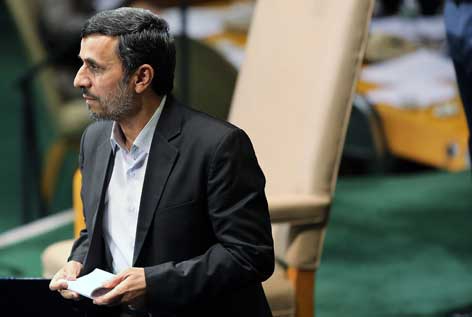Saturday 6 October 2012 - 14:34
Story Code : 6846
Iranian currency crisis threatens Mahmoud Ahmadinejad's rule
President's government is blamed for mismanagement and incompetence as rial hits all-time low
Iran's president,�Mahmoud Ahmadinejad, has survived many crises during his seven years in office, both at home and abroad. But fears over the�country's crumbling economy, which have exposed the extent of internal divisions at the top of the Islamic republic, could signal the beginning of the end.
Ahmadinejad has been left increasingly marginalised as the country's currency has plummeted, with analysts speculating that he is being used by his former allies as a scapegoat for the regime's problems.
With the rial reaching an all-time low this week, Ahmadinejad has been roundly rebuffed by his opponents, who blame his government for mismanagement and economic incompetence. The currency has lost a third of its value in a week, with the dollar now three times stronger against it than early last year.
At a press conference in Tehran this week, Ahmadinejad made a speech which highlighted the power struggle between his supporters and his conservative rivals in the parliament and the judiciary.
The president defended his economic policies and blamed the plummeting value of the rial both on western sanctions and a "propaganda campaign" perpetrated by his opponents at home.
Ahmadinejad's words widened the internal rift, prompting many of his parliamentary rivals � who form an overwhelming majority � to launch the strongest attack on him by regime insiders so far.
Abbas Rajaei, an MP for the central city of Arak, accused the president of "lying vividly to the people", and Kamalodin Pirmoazen, another parliamentarian, said he was inciting discontent among Iranians towards their officials. The influential MP Ali Motahari, an outspoken critic of Ahmadinejad, has also recently said that the president should not remain in presidential office "even for another single day".
Last week, while he was addressing the UN general assembly, his media adviser, Ali Akbar Javanfekr, was taken to Tehran's Evin prison. Ahmadinejad suggested this week that he wanted to inspect the prison, but authorities signalled that he would not be welcome.
Iranian state TV reported the closure of the bazaar and the discontent about the devaluation of currency. Analysts saw it as a sign that pressure is mounting on the president.
Sadegh Zibakalam, a professor of political science at Tehran University, said Ahmadinejad was increasingly becoming a "lame duck". Zibakalam said Ahmadinejad was being used as a scapegoat by many of the same people who were his supporters in the past.
"Ahmadinejad's economic policies are not new. They have been in place from the beginning. If there's a failure, it's not limited to Ahmadinejad. The leadership of fundamentalists should be held responsible too."
Fundamentalists, who are believed to be close to the country's supreme leader, Ayatollah Ali Khamenei, have accused Ahmadinejad and his allies, including his controversial chief of staff, Esfandiar Rahim Mashaei, of attempting to undermine clerical power and advocating nationalism and greater cultural openness.
"Ahmadinejad and Mashaei don't think they need to obey clerical power. They both have not been loyal enough to the supreme leader," said Zibakalam. He predicted that Ahmadinejad, who cannot run for a third time under Iranian law, would not be able to ensure the election of one of his allies in the 2013 vote.
The Iran Project is not responsible for the content of quoted articles.
# Tags











